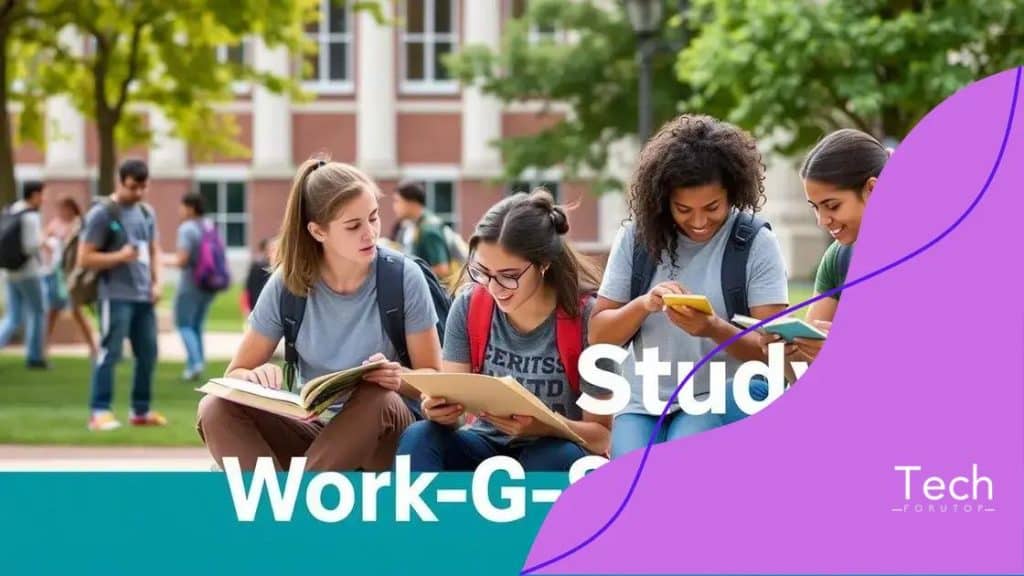College work-study program expansions: New opportunities await

College work-study program expansions provide students with valuable part-time job opportunities that help finance their education while gaining relevant work experience, enhancing their career readiness.
College work-study program expansions are becoming a game changer for students seeking both education and practical experience. Have you ever wondered how these programs could enhance your college journey? Let’s delve into the exciting opportunities they present.
Understanding work-study programs
Understanding work-study programs is essential for students looking to blend education with real-world experience. These programs not only help students finance their education but also provide valuable job skills that enhance their resume. Let’s explore the key aspects of work-study programs.
What are work-study programs?
Work-study programs are structured financial aid programs that allow students to work part-time while attending college. They can be federally funded or offered by individual institutions. Students in these programs typically work on campus but may have opportunities off-campus as well.
Benefits of work-study programs
Participating in a work-study program has numerous advantages. Firstly, it provides students with a significant way to offset tuition costs. Additionally, it offers them a chance to gain work experience while enhancing their academic skills.
- Flexible work hours that accommodate class schedules.
- Opportunities for networking within the industry.
- Development of time management skills.
- Improved financial independence.
Moreover, students often find that the jobs available through work-study enhance their understanding of what they are studying. They receive practical lessons that textbooks alone cannot provide.
How to qualify for work-study
To qualify for work-study programs, students must complete the Free Application for Federal Student Aid (FAFSA). This determines their financial need, which must be demonstrated to receive work-study funds.
Once enrolled, students can check with their college’s financial aid office to find available positions. This process helps students connect their educational goals with job opportunities that align with their career aspirations.
In conclusion, work-study programs are invaluable resources for students. They provide financial assistance while enabling participants to gain work experience and skills that benefit their future careers. By understanding and utilizing these programs, students can create a balanced and financially manageable college experience.
Benefits of college work-study
The benefits of college work-study programs are numerous and can greatly enhance the college experience for students. Through these programs, students can earn money, gain work experience, and develop skills that are crucial for their future careers.
Financial support
One of the most significant advantages is the financial relief that work-study provides. Students can earn money to help cover tuition and other college-related expenses. This income allows them to reduce their reliance on student loans.
Skill development
In addition to financial benefits, the work-study program allows students to develop valuable skills. Students gain hands-on experience in a work environment related to their field of study. They can improve their communication and teamwork skills, which are vital in any job.
- Time management—balancing work and study helps students prioritize tasks.
- Problem-solving—real-world scenarios allow for practical skill application.
- Networking—building connections with professionals can open doors for future opportunities.
- Resume enhancement—experience makes graduates more attractive to employers.
Moreover, the flexibility of work-study positions means that students can adjust their work hours around their academic commitments. This balance helps ensure that they do not feel overwhelmed.
Through these positions, students learn how to navigate a professional environment while still focusing on their education. Whether working in a library, lab, or campus office, every experience adds value.
Career exploration
Participating in a work-study program also allows students to explore different career paths. They can try out various roles to discover what aligns best with their strengths and interests.
This exploration is crucial in a student’s journey, as it provides clarity about their future career choices. In many cases, these experiences can even lead to full-time job offers after graduation.
How to apply for work-study positions

Applying for work-study positions can be a straightforward process if you know the steps to take. Many colleges have specific guidelines, but understanding the general process can help you get started. This journey begins with completing the Free Application for Federal Student Aid (FAFSA), which determines your financial need and eligibility.
Complete your FAFSA
The FAFSA is the first crucial step in applying for work-study. It is an essential form that students must submit to be considered for federal financial aid. Fill it out early to ensure you meet all deadlines for your school.
Check your eligibility
Once your FAFSA is processed, check your financial aid package. If you are eligible for work-study, your aid offer will reflect this. Look for specific details regarding how many hours you can work and the types of jobs available.
- Talk to your financial aid advisor for detailed information.
- Find out how your eligibility is determined at your institution.
- Understand the maximum earnings you can receive through the program.
After confirming your eligibility, it’s time to look for available positions. Each college has a list of job openings for work-study students. These listings often include a variety of roles across campus, from administrative work to research assistant positions. Check the school’s financial aid webpage or career services for these listings.
When you see a position that interests you, prepare your resume and cover letter. Highlight your skills and availability clearly to increase your chances of being hired. Be sure to mention your status as a work-study student in your application. This shows potential employers that you are looking for on-campus opportunities aligned with your education.
Prepare for the interview
If you get called for an interview, be ready to discuss your skills and experience. Dress professionally and practice common interview questions beforehand. Displaying enthusiasm about the position and your willingness to learn can leave a positive impression.
After a successful interview, you may receive a job offer. If you do, it’s important to follow any pre-employment procedures, which could include background checks and paperwork. This ensures you are cleared to start working as a work-study student.
Success stories from work-study participants
Success stories from work-study participants illustrate the profound impact these programs can have on students. Many students have transformed their lives through work-study, gaining both work experience and essential life skills.
Real-world experiences
For example, one student, Sarah, worked as a lab assistant during her time at college. This opportunity not only helped her pay for school but also allowed her to apply what she learned in the classroom. As a result, she gained practical skills that made her highly competitive in the job market after graduation.
Networking opportunities
Another participant, James, took a position in the university’s admissions office. Through this role, he met many professionals in his field of interest. These connections proved invaluable when job hunting after he graduated. Networking plays a crucial role in career success, and work-study programs can provide a platform for building those important relationships.
- Students often find mentorship through work-study roles.
- Many employers are impressed by the initiative shown by work-study students.
- Alumni often return to help work-study students find jobs.
Moreover, success stories often highlight personal growth. Many students learn how to balance their time effectively between work and studies, which prepares them for the demands of future employment. For instance, time management skills developed during their college years benefit them long after they graduate.
Building confidence
Having a work-study job can also boost a student’s confidence. Completing tasks and contributing to a team fosters a sense of accomplishment. This personal growth is highlighted in the stories of many participants who credit their work-study experiences for their newfound self-assurance.
Additionally, these experiences often lead to immediate job offers after graduation. Employers appreciate the work ethic and practical experience that work-study students bring to their companies. As a result, many students find themselves in careers directly related to their work-study positions.
Future of work-study programs
The future of work-study programs looks promising as many colleges and universities continue to expand their offerings. These programs are evolving to better support students financially while providing them with valuable work experience. Innovations in technology and shifts in educational priorities drive these changes.
Expansion of opportunities
As more institutions adopt work-study programs, the variety of jobs available is increasing. Students can find positions not only on campus but also in community organizations and businesses that partner with schools. This expansion allows for greater flexibility in job options and more opportunities to gain practical experience.
Integration with online learning
With the rise of online education, many colleges are adapting work-study programs to include remote work options. Students enrolled in online classes can take advantage of virtual work-study positions. This adaptation makes it easier for students to balance their academic and work commitments regardless of their location.
- Increased accessibility for diverse student groups.
- Flexibility in scheduling to accommodate various learning styles.
- Enhancement of digital skills through remote work.
Furthermore, as industries rapidly change, colleges are also shifting their work-study job placements to align with emerging workforce trends. This ensures that students can develop skills relevant to their fields. For instance, positions in areas like tech support, social media management, and data analysis are becoming common.
Emphasis on mentorship
The future may also place a greater emphasis on mentorship within work-study roles. Students will likely have increased access to mentors who can provide guidance and support. This could lead to better job placements and increased confidence in their professional capabilities.
Through effective mentorship, students can navigate their career paths more easily. This approach helps them build networks that may be beneficial long after graduation. Colleges are recognizing the importance of not only providing jobs but also fostering relationships that will benefit students in their future careers.
The future of work-study programs holds great promise for students. As colleges adapt and expand these opportunities, students can look forward to more flexible job options that align with their educational goals. The integration of remote work, along with an emphasis on mentorship, provides an even more robust support system for students. Through work-study, students not only gain financial assistance but also valuable skills, connections, and experiences that will help shape their futures. Embracing these programs can lead to bright pathways in both education and career development.
FAQ – Frequently Asked Questions about College Work-Study Programs
What are college work-study programs?
College work-study programs are financial aid options that allow students to work part-time while attending school to help cover educational expenses.
How do I apply for a work-study position?
To apply, you must complete the Free Application for Federal Student Aid (FAFSA) and check with your college’s financial aid office for available positions.
What types of jobs are available through work-study?
Jobs can vary widely and may include administrative roles, research assistance, or positions in campus facilities, often related to the student’s field of study.
Can I work remotely in a work-study position?
Yes, many colleges are now offering remote work-study positions, especially as online education becomes more popular, allowing flexibility for students.





